Jigsaw puzzles from Japan
The Attic
Deleted puzzles
This page shows puzzles that are no longer available, just for historical curiosity, and for completeness.
In some cases puzzles are reissued with a different code number: if you have the old code number from somewhere, this page should show you the replacement (which may still be available).
1053 pieces
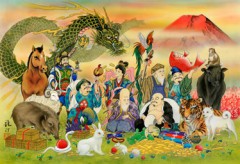 © Ryutei Seven lucky gods and the zodiac animals (Ryutei)The seven gods of good fortune sit surrounded not only by the usual collection of treasure, but also by a large dragon and all the other Chinese zodiac animals, with a red Fuji in the background for good measure. Ryutei is almost certainly a brushname, but absolutely no other details of the artist are available...
 Permanently unavailable Permanently unavailableDiscontinued November 2017 An Apollo puzzle: 1053 pieces; 380 x 260 mm (15" x 10") Code: P47702 (47-702 on package) Retail price ¥2000 |
1000 pieces
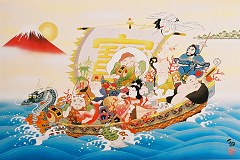 © Tanimoto Ichirô The treasure ship (Tanimoto)The seven gods bring treasure, while showing off their distinct characters. The turtle and crane are the usual good luck figures, while some stylised pine trees and Mount Fuji complete the background. Born in 1951 in Kyoto, the artist Tanimoto Ichiro studied Japanese art, and has worked as a designer. He has held a number of exhibitions of kimono patterns, and although he paints traditional themes, his style is one of bold and direct characterisation, more reminiscent of textile design than brushwork.  Permanently unavailable Permanently unavailableAn Appleone puzzle: 1000 pieces; 750 x 500 mm (30" x 20") Code: A10432 (1000-432 on package) Retail price ¥3600 | ||
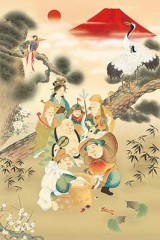 © Ukai Yuhei Seven gods and seven wishes (Yuhei)The seven gods gather in a group with all the usual lucky emblems around them — red Mt Fuji, cranes, turtles, and so on. The rather jolly two in front are Daikokuten and Ebisu, who are somehow producing money by pounding the glutinous mochi rice which is traditionally always prepared this way. No biographical information is to be found on the artist Ukai Yuhei, another of the craft producers of traditional images particularly for kakemono scrolls. He signs his work the traditional way, with his given name Yuhei, and a seal of the same.  Permanently unavailable Permanently unavailableDiscontinued February 2025 An Appleone puzzle: 1000 pieces; 500 x 750 mm (20" x 30") Code: A10679 (1000-679 on package) Retail price ¥3000 | ||
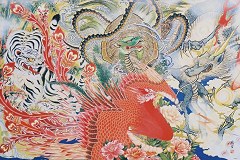 © Tanabe Zigen Four gods (Zigen)An exhuberant interpretation of the Four Gods theme - Suzaku in particular is a dazzling crimson. The artist was born in Toyama in 1970, and specialises in showy images, in his own reinterpretation of traditional Japanese themes. Tanabe is his family name; he signs his paintings with his given name Zigen. Note that the usual Romanisation of this would be "Jigen", but it seems that Zigen may be the artist's own preference. 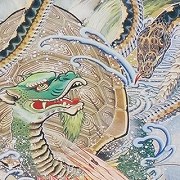 Detail shows the two heads of Genbu, the snake/turtle. This is a "Glow-in-the-dark" puzzle.
 Permanently unavailable Permanently unavailableA Beverly puzzle: 1000 pieces; 720 x 490 mm (28" x 19") Code: B31331 (31-331 on package) Retail price ¥3300 | ||
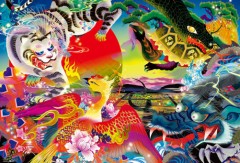 © Daruma Shoten 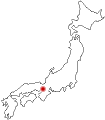
Four gods in KyotoA modern, even psychedelic, rendering of the four gods: blue dragon and white tiger, Genbu the entwined snake and turtle, and Suzaku the red phoenix. These four protectors of the compass points were an ancient import from China, and in the year 794, when the Emperor Kammu moved the capital from Nara to modern Kyoto, it is said that to help the four gods protect it he had the streets laid out on a NSEW grid, as we see here in the background. This started the great flowering of Japanese culture called the Heian Period (which is why the capital was then called Heian-kyo). This image comes from a group of digital artists in Kyoto called Daruma Shoten. Website: http://dalma.jp  Permanently unavailable Permanently unavailableA Beverly puzzle: 1000 pieces; 720 x 490 mm (28" x 19") Code: B51101 (51-101 on package) Retail price ¥2800 | ||
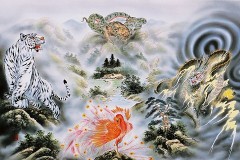 © Noda Sesson Four gods of feng-shui (Sesson)In this version, the four gods surround a rustic scene, in rather delicate forms: the tiger and dragon look fierce enough, but Suzaku the red phoenix provides a delightfully contrasting filigree.
No biographical details available. Conventionally, artists are known by their "given names", though the 'son' character in particular clearly indicates this as a "brush name."  Permanently unavailable Permanently unavailableA Beverly puzzle: 1000 pieces; 720 x 490 mm (28" x 19") Code: B61155 (61-155 on package) Retail price ¥3000 | ||
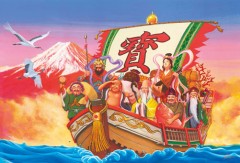 © Koga Treasure ship (Koga)The group of Seven Gods, smiling as always, bring home their treasure, red coral, gold coins, bales of rice, jewels, and more. Mount Fuji glows red in the background, and a pair of cranes complete the scene. Born in Fukuoka in 1957, the artist Masawo Koga started out as a freelance illustrator in 1988. He produces book jackets, posters, game packaging and other work, specialising in realistic portrayals of nature, yet his images have a touch of fantasy to them. He signs his work with his family name Koga in stylised capital letters.  Permanently unavailable Permanently unavailableDiscontinued September 2018 A Beverly puzzle: 1000 pieces; 720 x 490 mm (28" x 19") Code: B61323 (61-323 on package) Retail price ¥3000 | ||
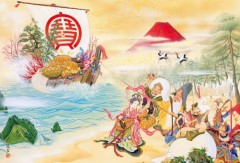 © Zigen Tanabe The treasure ship arrives (Zigen)The seven lucky gods are in a jolly mood as usual, most of them hard at work pulling the treasure ship ashore, while Benzaiten plays the lute for artistic inspiration. All the usual symbols are present: plum, pine, and bamboo, gold, red coral, the turtle, and in the background more good fortune as two cranes are set against the Red Fuji in the distance. The artist was born in Toyama in 1970, and specialises in showy images, in his own reinterpretation of traditional Japanese themes. In 2000 he started to exhibit in the USA and now lives in New York State. Tanabe is his family name; he signs his paintings with his given name Zigen. Note that the usual Romanisation of this would be "Jigen", but it seems that Zigen is the artist's own preference.  Permanently unavailable Permanently unavailableDiscontinued January 2019 A Beverly puzzle: 1000 pieces; 720 x 490 mm (28" x 19") Code: B61376 (61-376 on package) Retail price ¥3000 | ||
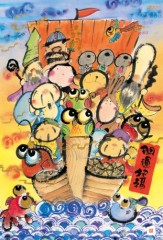 © Youseki Miki Treasure boat (Youseki)The usual seven gods aboard their treasure boat, but with many distinctive Youseki touches: three prominent Jizō statues, for a start. The banner is inscribed 開運招福 (kaiun-shōfuku), which translates roughly as "May fortune smile upon you!" Born in Kyushu in 1966, Youseki Miki studied calligraphy, and after graduating from university embarked on a career as a commercial designer. He has developed a distinctive style of illustrated calligraphy with a contemporary, jovial touch. He writes his adopted brush name Youseki with nonstandard romanisation, to be read as the English word "you" plus "seki". (Miki is his family name, and his real name is Izuru.)  Permanently unavailable Permanently unavailableDiscontinued June 2017 A Beverly puzzle: 1000 pieces; 490 x 720 mm (19" x 28") Code: B61377 (61-377 on package) Retail price ¥3000 | ||
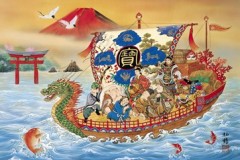 © Mori Seikaku Seven gods arrive with treasure (Seikaku)The seven gods bringing home their treasure ship, conveying wealth and good fortune to us all. They have a jolly demeanour, and their ornately decorated vessel carries the usual chests of gold coin, and also the prized red coral. There are no blank areas in the surroundings, which present more auspicious symbols: cranes, Mt. Fuji, a red snapper, and the Shinto emblems of the torii (ceromonial arch) and two rocks joined by a shimenawa (sacred rope). 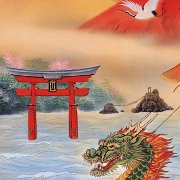 No biographical details, but the artist Mori Seikaku specialises in animal and flower scroll paintings. He signs his work the traditional way, with the characters for his given (brush) name, Seikaku (lit. 'nest of the crane') and a seal of the same.  Permanently unavailable Permanently unavailableAn Epoch puzzle: 1000 pieces; 750 x 500 mm (30" x 20") Code: E11219 (11-219 on package) Retail price ¥3000 | ||
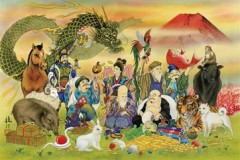 © Ryutei Seven lucky gods and the zodiac animals (Ryutei)The seven gods of good fortune sit surrounded not only by the usual collection of treasure, but also by a large dragon and all the other Chinese zodiac animals, with a red Fuji in the background for good measure. Ryutei is almost certainly a brushname, but absolutely no other details of the artist are available...  Permanently unavailable Permanently unavailableAn Epoch puzzle: 1000 pieces; 750 x 500 mm (30" x 20") Code: E11391 (11-391 on package) Retail price ¥3000 | ||
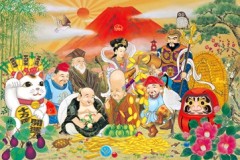 © Epoch Seven gods and twenty virtuesThe Seven Lucky Gods always bring a promise of worldly wealth, and to make sure of this in this picture they have enlisted the help of the fortune-beckoning cat (maneki-neko), a Daruma, and all the other lucky symbols you can think of, from a red Mount Fuji to the little turtle in the foreground...  Permanently unavailable Permanently unavailableAn Epoch puzzle: 1000 pieces; 750 x 500 mm (30" x 20") Code: E11413 (11-413 on package) Retail price ¥3000 | ||
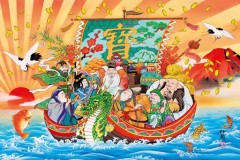 © Mori Seikaku Treasure boat (Seikaku)The seven lucky gods arrive on their boat, heavily laden with treasure — the giant character on the sail is the old form of takara, or "treasure". Cranes and other auspicious creatures surround them, and the rising sun and a red Mount Fuji complete the background. No biographical details, but the artist Mori Seikaku specialises in animal and flower scroll paintings. He signs his work the traditional way, with the characters for his given (brush) name, Seikaku (lit. 'nest of the crane') and a seal of the same.
 Permanently unavailable Permanently unavailableDiscontinued July 2021 An Epoch puzzle: 1000 pieces; 750 x 500 mm (30" x 20") Code: E11562 (11-562 on package) Retail price ¥3000 |
954 pieces
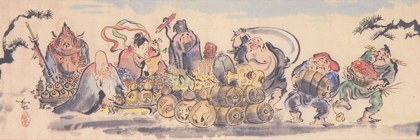 © Sasagawa Kazuya Seven lucky gods (Kazuya)The Seven Lucky Gods (Shichi-fuku-jin) are an assemblage of deities from all across Asia, who are invariably seen as bringers of treasure. They do look a merry lot! From left to right (same numbers as the key on the box), they are:
Mark Schumacher's page has lots more on the Seven Lucky Gods Born in Tokyo in 1930, Sasagawa Kazuya is a traditional artist with a particular affection for the jovial Seven Gods, it seems. Kazuya is his given name, with which he signs and seals his pictures, in the usual way.  Permanently unavailable Permanently unavailableAn Epoch puzzle: 954 pieces; 1020 x 340 mm (40" x 13") Code: E09001 (09-001 on package) Retail price ¥3000 |
450 pieces
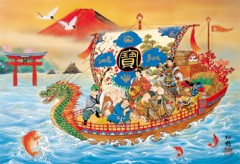 © Mori Seikaku Seven gods arrive with treasure (Seikaku)The seven gods bringing home their treasure ship, conveying wealth and good fortune to us all. They have a jolly demeanour, and their ornately decorated vessel carries the usual chests of gold coin, and also the prized red coral. There are no blank areas in the surroundings, which present more auspicious symbols: cranes, Mt. Fuji, a red snapper, and the Shinto emblems of the torii (ceremonial arch) and two rocks joined by a shimenawa (sacred rope). No biographical details, but the artist Mori Seikaku specialises in animal and flower scroll paintings. He signs his work the traditional way, with the characters for his given (brush) name, Seikaku (lit. 'nest of the crane') and a seal of the same.
 Permanently unavailable Permanently unavailableDiscontinued November 2024 An Apollo puzzle: 450 pieces; 380 x 260 mm (15" x 10") Code: P46507 (46-507 on package) Retail price ¥1400 |
420 pieces
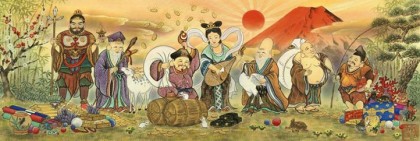 © Mori Seikaku Seven lucky gods (Seikaku)The seven lucky gods in a jolly mood, surrounded by the usual treasure and other auspicious items. Left to right: Bishamonten, Indian god of war and treasure - Jurojin, Chinese god of longevity - Daikokuten, Indian god (Mahakala) of five cereals - Benzaiten, Indian goddess of the arts - Fukurokuju, Chinese god of wisdom - Hotei, Chinese god of happiness - Ebisu, Japanese god of commerce. An eclectic group... No biographical details, but the artist Mori Seikaku specialises in animal and flower scroll paintings. He signs his work the traditional way, with the characters for his given (brush) name, Seikaku (lit. 'nest of the crane') and a seal of the same.
 Permanently unavailable Permanently unavailableAn Epoch puzzle: 420 pieces; 515 x 182 mm (20" x 7") Code: E52113 (52-113 on package) Retail price ¥1800 |
300 pieces
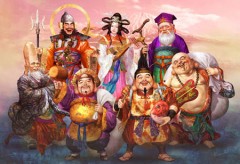 © Hiroyuki Suwahara The jolly seven gods of fortune (Suwahara)The Seven Lucky Gods (Shichi-fuku-jin) have left their treasure boat, and assembled for a group photo, with Mount Fuji conveniently in the background. Suwahara makes them all look exceedingly jolly - here's the lineup: Top row, left to right: Bishamonten, Indian god of war and treasure - Benzaiten, Indian goddess of the arts - Jurojin, Chinese god of longevity Front row, left to right: Fukurokuju, Chinese god of wisdom - Daikokuten, Indian (Mahakala) god of five cereals - Ebisu, Japanese god of commerce - Hotei, Chinese god of happiness Born in Ibaraki, in 1969, Suwahara embarked on a career as a freeleance illustrator in 1996. He has specialised in historical figures, especially from the Three Kingdoms story, and brings a very modern technique to some traditional themes. Suwahara is his family name.  Permanently unavailable Permanently unavailableDiscontinued November 2024 A Beverly puzzle: 300 pieces; 380 x 260 mm (15" x 10") Code: B63215 (63-215 on package) Retail price ¥1400 |
- 17 puzzles shown
- Explore the attics: complete list of deleted puzzles

 This puzzle has TINY pieces!
This puzzle has TINY pieces!